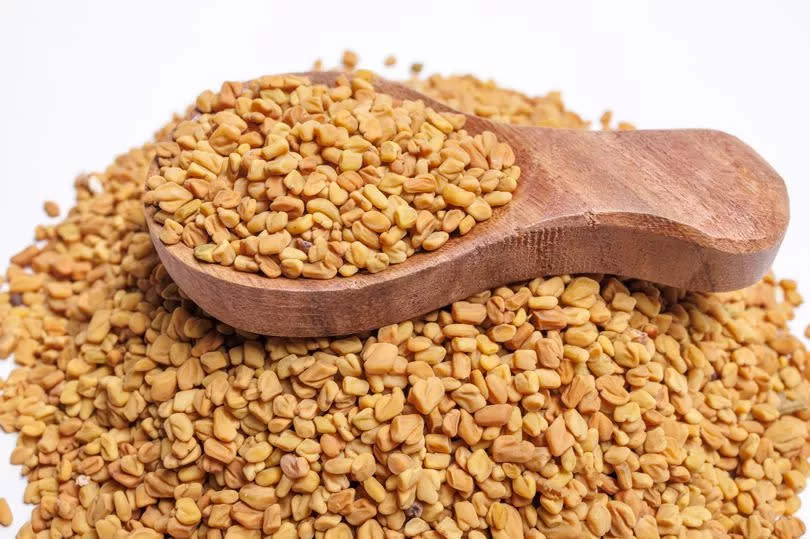The 12p tablet experts say could reverse and prevent diabetes

Health experts have highlighted a particular herb that could help reverse or prevent diabetes.
Research has shown that fenugreek can have a positive impact on blood sugar and cholesterol levels. Fenugreek is available in pill form from health food stores such as Holland and Barrett. A tub of 90 capsules costs £10.99, working out at just 12p per tablet.
The leaves and seeds of fenugreek plants are versatile and can be used in a variety of ways. They add a unique flavour to curries and other dishes, making them a staple ingredient in many Asian recipes. Fenugreek is also recognised for its medicinal properties.
Fenugreek seeds, otherwise known as trigonella foenum graecum, are rich in soluble fibre. This type of fibre helps to lower blood sugar levels by slowing down digestion and the absorption of carbohydrates, reports Wales Online.
What does the research say?

Numerous studies have indicated potential anti-diabetic benefits of fenugreek. Several clinical trials have shown that fenugreek seeds can alleviate various metabolic issues associated with type 1 and type 2 diabetes, including reducing blood sugar levels and improving glucose tolerance.
Research in India has shown that adding 100 grams of defatted fenugreek seed powder to the daily diet of people with type 1 diabetes can significantly reduce fasting blood sugar levels. It also improved glucose tolerance and lowered total cholesterol, LDL cholesterol, and triglycerides.
In a different study, individuals with type 2 diabetes who consumed 15 grams of powdered fenugreek seeds with a meal experienced a smaller rise in post-meal blood sugar levels. Further research indicated that taking 2.5 grams of fenugreek twice daily for three months could benefit those with mild type 2 diabetes by reducing blood sugar levels, although it had no effect on severe cases.
A study in 2015 further confirmed the benefits of fenugreek seeds in managing blood glucose levels in diabetic patients. Over a period of three years, men and women aged between 30 and 70 with prediabetes were divided into two groups.
One group received fenugreek powder twice daily before meals, while the other did not. By the end of the trial, there was a significant reduction in the incidence of diabetes among participants who took fenugreek compared to those who did not.
The study noted: "The outcome of diabetes in Fenugreek group was positively associated with serum insulin and negatively associated with insulin resistance."
What other health benefits does fenugreek offer?
Fenugreek seeds are packed with vitamins, minerals, and antioxidants that help protect our body's cells from damage caused by unstable molecules known as free radicals.
They have been used for centuries by nursing mothers to boost breast milk production during pregnancy and postpartum. Additionally, they are commonly used to treat colds and sore throats due to their potent antiviral properties.
Studies have also suggested that fenugreek seeds may potentially assist with conditions such as arthritis, high cholesterol, skin problems including wounds, rashes, and boils, bronchitis, abscesses, hair loss, constipation, upset stomach, kidney issues, heartburn, male impotence, and various sexual dysfunctions.
Before trying it, ensure to consult with your doctor and diabetes healthcare team to confirm that it's safe for you. If you experience any negative reactions, stop using them and seek medical advice.
Similar to other herbs that reduce blood sugar, fenugreek might potentially lower your blood sugars excessively (hypoglycaemia) when taken alongside prescribed diabetes medications. This could mean that you may need to modify the dosage of your anti-diabetic medication.
Food supplements should never be used as a replacement for a diverse and well-balanced diet, as well as a healthy lifestyle. If you are pregnant, breastfeeding, taking any medications, or under medical supervision, it is important to consult a doctor or healthcare professional before using them.
What is diabetes?
Diabetes is a condition that causes a person's blood sugar level to become too high. There are two main types of diabetes:
Type 2 diabetes is far more common than type 1. In the UK, over 90% of all adults with diabetes have type 2.
High blood sugar that develops during pregnancy is known as gestational diabetes. It usually goes away after giving birth.

 Yahoo News
Yahoo News 
